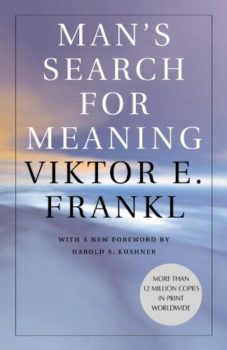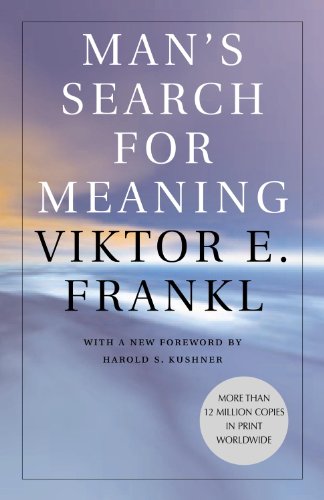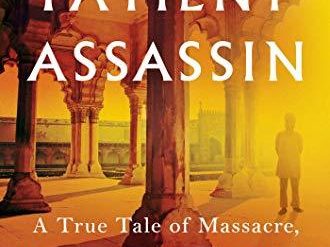
Life is not primarily a quest for pleasure, as Freud believed, or a quest for power, as Alfred Adler taught, but a quest for meaning.” This is the conclusion that a young Viennese psychiatrist, Viktor E. Frankl, reached in the course of more than three years in a succession of four Nazi concentration camps, including Auschwitz. The book he wrote in the space of nine days in 1946, originally under another title, morphed over the years into the thin volume known around the world today as Man’s Search for Meaning. It has sold more than 12 million copies and been translated into 24 languages, serving as a source of lessons for living for millions of people. Man’s Search for Meaning is frequently cited as one of the most important books of the 20th Century.
Frankl’s almost matter-of-fact description of his years in concentration camps is profoundly moving, the more so because it’s a fiercely personal document and makes no attempt to relate the familiar statistics now surrounding the topic or to place the Nazi phenomenon in historic perspective. Frankl writes simply about how he personally managed to remain hopeful in the face of staggering brutality, including the murder of his young wife at Bergen-Belsen and the death of numberless friends and colleagues. As Frankl relates, their deaths came not only at the hands of SS guards but also, at least equally, as the result of sadistic behavior by the “Capos,” prisoners themselves raised to positions of authority and privilege by the Nazis. The effect of reading this material is searing. Here, God is truly in the details.
Man’s Search for Meaning by Viktor E. Frankl (1946) 188 pages ★★★★☆
However, Frankl’s story about life in the concentration camps is only one of several parts in Man’s Search for Meaning. The edition I read included five pieces written over more than half a century by three different authors: a foreword by Rabbi Harold S. Kushner, an Afterword by William J. Winslade, and three articles by Frankl. The first of these three, “Experiences in a Concentration Camp,” has received the most attention from non-professionals.
The second, “Logotherapy in a Nutshell,” is Frankl’s brief summary of the principles and procedures of logotherapy, the “third school” of Viennese psychiatry that Frankl created — an approach that’s often termed “existential psychiatry.” (Somehow, Carl Jung seems to have gotten lost in the numbering system — perhaps because he was Swiss, not Viennese.) Frankl also wrote a “Postscript 1984” bearing the title, “The Case for a Tragic Optimism.” And all this writing fits comfortably into a remarkably thin little volume.
Exploring the author’s approach to therapy
Intellectually, Frankl’s abbreviated introduction to logotherapy for the layperson, was the most intriguing part of the book. The term itself is derived from the much-used Greek word, logos, which has been applied to all manner of pursuits in philosophy, rhetoric, and religion. Frankl took it to mean something like “meaning.” He rejected the determinism of Freudian and Adlerian psychiatry, insisting that neither approach was useful in treating more than a minority of psychological problems. In his own practice and that of the students under his supervision in a series of top Viennese hospitals, Frankl found that many psychological problems could be easily cured by one or a few conversations between the patient and the logotherapist.
Logotherapy involved no years-long sojourns on the analyst’s couch. (In fact, patients sat in chairs.) He cites many cases of ingrained phobic and compulsive behavior that he and his disciples cured by somehow convincing patients not to worry about their behavior. A lifelong stutterer, for example, was cured when he was persuaded to enter conversations unconcerned about stuttering — and the cure was lasting. A fellow physician transcended his depression over the loss of his wife in a single, short conversation with Frankl. The essential truth of logotherapy is as Frankl discovered in the camps: so long as we maintain a powerful commitment to some life goal outside our present circumstances, we can get through practically any privation.
Man’s Search for Meaning should be in everyone’s library. The lessons Viktor Frankl teaches can be applied to challenges in any culture and all walks of life.
For further reading
Check out Good books about the Holocaust, including both fiction and nonfiction.
You’ll find this book listed on my post, 5 top nonfiction books about World War II.
You might also enjoy The 10 best novels about World War II and 20 top nonfiction books about history.
And if you’re looking for a broader view of human history, check out New perspectives on world history.
And you can always find my most popular reviews, and the most recent ones, plus a guide to this whole site, on the Home Page.




























Jung was “left out”, as you surmised that he was not Viennese. Also, Jung focused on many other matters, but not primary life motivations as did Freud, Adler and Frankl.